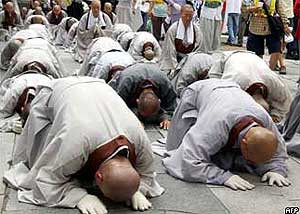KOREAN GOVERNMENT CANNOT AFFORD TO ALIENATE BUDDHISTS
Aug 26, 2008
SEOUL, South Korea – A protest rally against alleged religious bias of the Lee Myung-bak administration was threatened for Wednesday, with Buddhists to gather at Seoul Plaza Wednesday afternoon to demand an open apology from President Lee and legislation against religious discrimination.
 Buddhists have mobilized participants and instructed temples across the country to attend the rally. Significantly more monks and laypeople than took part in the July 4 Buddhist protest against the Lee administration, are expected to participate.
Buddhists have mobilized participants and instructed temples across the country to attend the rally. Significantly more monks and laypeople than took part in the July 4 Buddhist protest against the Lee administration, are expected to participate.
Elements of conflict have existed between Buddhism and the Lee administration since the government took power. The evangelical zeal of Lee, a Presbyterian, is well known; he provoked controversy as Seoul mayor when he dedicated the metropolis to God.
Buddhists began to entertain serious suspicions when they saw the lineup for the presidential office and Cabinet. A senior government official’s imprudent remark — “My dream is to evangelize all government ministries and offices” — did little to dispel the suspicions.
And when the Seoul metropolitan area transportation information system Algoga (“find your way”), administered by the Ministry of Land, Transport and Maritime Affairs, omitted the names of major temples late in June, things reached boiling point.
If we look closely at each step, the administration is not without justification. The problem is that avoidable misunderstandings are being repeated. In early August when Buddhist anger came to the fore, the Education, Science and Technology Ministry’s website, the Educational Geographical Information System, again omitted famous large temples.
Prime Minister Han Seung-soo issued a directive early in July asking ministries and agencies to take special caution not to invite misunderstandings from religious circles. Algoga and the information system were built by the same firm. With a little care, the error would not have happened again.
To make the matter worse, police, in the course of arresting Buddhist ringleaders in candlelight protests, searched the car of the Jogye Order leader, the Venerable Jigwan.
The attitude of the administration and the ruling party since Buddhists complained is inappropriate. Cheong Wa Dae staff and other officials have only paid lip service to the issue and senior ruling party officials have been busy visiting provincial temples in a bid to placate monks.
Some Buddhists even called for a rejection of their visits. It took until last week for the Ministry of Culture, Sports and Tourism to emerge as the official channel for dialogue with the Jogye Order. No wonder Buddhists have yet to be convinced of the administration’s sincerity.
The protests won’t cease until the government makes a sincere apology and comes up with measures to prevent such actions, Buddhists say. “We could continue protesting for the next five years,” said one. Their suspicions of the government run so deep that a resolution of the conflict will be very difficult.
The burden for the Buddhist leadership must be great as well. The conflict could deteriorate into a religious rift or invite criticism that Buddhism fans social unrest. That is why Buddhists also need to reconsider demands that have nothing to do with religious bias, such as that leaders of illegal protests against U.S. beef imports should be struck off the wanted list.
The two sides have become like locomotives running at each other. But a sustained confrontation between the government and the religion that has the most followers in the country is desirable for no one. Buddhism and the administration should slow down, conduct frank dialogue and search for a compromise.
The administration should map out specific measures assuring the trust of Buddhists, and Buddhist leaders should look at the situation from a broader viewpoint, freeing themselves from the sense of victimhood. The public hope that Wednesday’s rally will mark not a renewal but an end to the conflict.
The column was contributed by Chosun Ilbo in-house columnist Lee Seon-min.
Source : Chosun Ilbo




